John R. Gordon writes exclusively for ka-os|theory about this year's series of Doctor Who. Gordon wrote the screenplay for Noah's Arc: Jumping the Broom , as well as episodes of the TV series, the short film Souljah, and for the stage, Faggamuffin. His novels iclude the award-winning Skin Deep
, as well as episodes of the TV series, the short film Souljah, and for the stage, Faggamuffin. His novels iclude the award-winning Skin Deep , Warriors and Outlaws
, Warriors and Outlaws , and Black Butterflies.
, and Black Butterflies.
 Parallel Lives
Parallel Lives Y
ou know when you have one of those moments where you find yourself in a parallel universe? I’ve been having that sensation in relation to the latest series of Doctor Who. Everyone I know personally who’s a fan found it deeply unsatisfactory. Everyone else out there in the world seems to absolutely love it. Yet despite reading blog after blog after review after review of raving enthusiasm for the new season I also read that ratings slid downwards as the season went on, suggesting a growing dissatisfaction among viewers. Is some sort of misperception filter in effect? If so, as in Amy’s Choice, is it working on us or on them? For what it’s worth, here’s my thinking on the subject…
Remember when Russell T. Davies stepped down from Doctor Who, leaving it in what seemed to be a safe pair of hands, Steven Moffat’s? I was hopeful at the time because Moffat was one of the best writers on the show, and also one who seemed to revel in what I believe to be Doctor Who’s true (or at least most successful) aesthetic – the fusion of science-fiction and horror achieved by writers like Nigel Kneale and H. P. Lovecraft, and of course within the show’s own history by Robert Holmes in the 1970s. It also seemed reasonable that Moffat, in order to renew it and add to its success, would address what viewers of all sorts had identified as the annoying and unsatisfactory features of Davies’ vision of the show.
The primary annoyance, picked up on by the tabloids as well as fans, was an excess of sentimentality and soap-opera-ish ‘relationship’ elements in many stories that tended to lead to denouements to episodes that were both lachrymose and repetitive. Many of us started to long for a dry eye in the house. This tendency repeatedly resulted in emotional resolutions to dramatic situations that outweighed logical or scientific ones. This inevitably weakened the show in terms of basic story-telling in a cumulative fashion, which was why so many of us went from loving Rose (and Billy Piper’s mostly wonderful performance) in Season 1 to sneakily – or not so sneakily – longing to see the back of her by the end of Season 3 – never mind 4.
The second annoyance – to me, and surely to the mass of more casual viewers - was an increasingly cumbersome weight of overarching cosmic back-story which oriented too many stories around the choices and actions of the companion, not the Doctor. This necessarily diminished the wonder of the show, as it tended to promote the reductive cliché that the wonders of the universe are as nothing when compared to the wonders of the human heart.
At the same time people were recognising that there was an embarrassing tendency for the Doctor to shout at any enemy he came across that he was the most powerful, dangerous person in the universe, that he always won, and that they should give up right now – and he would then go on to win, not because of any particular skill, courage or wisdom on his part, but because the show’s called Doctor Who, so he’s not going to be killed off, is he? Thus the Doctor’s grandstanding became a grotesque parody of its original intention, which was to show the pluck of a lone individual without any resources beyond his own intelligence in the face of insuperable opposition. This sort of approach inevitably created all sorts of weird narrative ‘cheats’ – most obviously the random assertion that some events in time are fixed, and so even the Doctor can’t change them. Unless he can. But then he can’t. Or he can. Or can he? (cf Waters of Mars).
I like a great deal of what Davies did with Doctor Who: so many initially really good choices – like the simple rooting of the show in the wonder of an ordinary working-class girl (revolutionary for Doctor Who just for that!) at being shown the illimitable strangeness of the universe. Like attending to what being with the Doctor does to his human companions in terms of the rest of their lives. Like including gay characters, about which even the Daily Mail didn’t complain. Like casting determinedly multiracially at all times. Like reworking the Doctor as the last of the Time Lords, a decision that was bold and a real success. And he often used elements of the suburban, domestic and soap-operatic to touching effect. But he’d expressed his vision by the end of Season 4, and he was right to go when he did.
Taking all of that into consideration, (and bearing in mind RTD’s stated decision to leave behind him as clean a slate as possible for his successor), my hope was that Moffat would pare out the increasingly-burdensome & overly-foregrounded season arc ideas, cut down the soapy sentimentality that had come to distort the story-telling, and go for punchy, suspenseful scripts that were clearly and efficiently told. I felt a twinge of unease when I heard he had mentioned bringing in a ‘Twilight’ style fantasy element, but put it aside – after all, I had very much enjoyed, say, Tooth and Claw back in Season 2. And what happened?
He magnified everything that seemed to me to be most unsatisfactory in the show to a level that made it near-unwatchable.
What I find odd is that no-one seems to have remarked on the painfully recycled nature of pretty much every single element in the new series. We have yet another girl companion with a nerdy boyfriend (Rose & Mickey); yet another girl who falls in love with the Doctor (Rose, Martha); yet another girl who is at some centre of series-arc convergence of meaningfulness (Rose, Donna); yet another girl who spends too much time being unimpressed with the Doctor (Donna); yet another starts-off-nerdy-but-becomes-heroic boyfriend (Mickey). The main change is that Amy’s romantic issues are now allowed to dominate the whole series as if her trivial relationship with Rory is the most important thing in the Universe. In the final episode, The Big Bang, Matt Smith’s Doctor even validates the notion that saving your fiancé is more important than saving the lives of billions of other people – a conclusion we’re meant to applaud, when in fact it’s selfish to the point of moral bankruptcy.
RTD was careful to pull back from an excess of convergence by including a decent amount of what I would call ‘normal’ stories – that is, tolerably self-contained ones - even creating a series of one-off companions for the final season in order to ensure the focus returned (in however annoyingly overblown a fashion) to the Doctor. In the new season virtually every story was about Amy’s arc, and as she became more ‘mysterious’ (no parents, no memory etc) the effect became more perverse and unsatisfactory. It’s the Doctor who’s meant to be mysterious; the companion is meant to be someone for the viewer to relate to.
I had heard Moffat say that he was ‘aiming the show at a younger audience’. By this I’d assumed he meant children, and in the first episode Matt Smith is at his charming best in his scenes with the ten-year-old Amy. Having such a young actor playing the Doctor meant that a child companion made sense in terms of dramatic and psychological balance, and everyone I know who saw that episode said they would have enjoyed it if she had joined Matt Smith’s Doctor in the Tardis.
What I didn’t think Moffat meant by a younger audience was teenage girls and pretty much no-one else. For myself I really couldn’t care less about Amy’s underpowered affiancement to her dull boyfriend. Her slatternly style, her happiness to run off with the Doctor on the eve of her wedding, and her blunt attempt to have sex with him, made it plain that her relationship with Rory was trivial, and the rest of the series had to try and claw it back from that obvious fact in order to make us care. It seemed to me entirely a straight man’s fantasy that sex-pot Amy would fall for cloddish but amiable Rory. But then one could argue that Captain Jack was RTD’s fantasy. What I found more troubling was that this focus on relationship issues must surely have bored, alienated and/or confused children. So many stories, (quintessentially The Lodger, itself narratively a rehash of The Girl in the Fireplace), ended up with the proclaiming of a romantic relationship as the deus ex machina that solved the plot dilemma. Surely this is something no pre-pubescent boy or girl would really relate to or be excited by; surely it would make them feel shut out. Why make such a choice?
Moreover, consider the confused morality of Vampires of Venice. Amy, despite knowing she will be marrying Rory ‘tomorrow’ tries to press the Doctor to have sex with her. He declines, stating (on no evidence at all) that she ‘really’ loves Rory, and so her wanting to fuck him is just – I don’t know; perhaps what my friend Mat Frasier, the Thalidomide Ninja, calls ‘freak fucking’. To correct her moral turpitude and prove (by psychological mechanisms that seem obscure to me) that really she loves Rory, the Doctor whisks them all off to plague-ridden Venice for a romantic weekend get-away. Because we all know that an expensive holiday saves a marriage, don’t we?
At this point vampire fish intervene and distract us briefly from the moral and psychological shambles of the set-up. The Doctor dispatches them (fairly callously) by climbing up a tower in the rain, (a clone of the denouement of a previous yarn, The Magic Lantern, and as someone else pointed out, the fish-vampires were the second fish-type aliens in this season). But my point really is that the confused emotional romance-focused set-up of the story is inhospitable to children. Amy doesn’t even have parents, never mind siblings, and nor does anyone else: only romance (or romantic-fraternal relationships in the case of the Doctor) seem to exist in Moffat-land.
Hence the inevitable River Song: the Doctor’s wife-to-be. Or is she? Or isn’t she? But how interesting is all this? Is it really that much more interesting than good, strong sci-fi/horror story-telling? Really? And to who?
A consequence of this misdirection is that poor Matt Smith has to stretch his characterisation between the - to my mind – mostly embarrassing Tennant-era ‘I always win’ grandstanding and a slightly wet ‘best mate at school you can talk to’ subordination to precocious Amy’s mundane relationship tribulations, which, we are constantly told, are what is ‘really’ important - a ridiculous, contradictory set-up with which to lumber the star of the show. I say ‘star’, but I think Moffat’s ultimate goal is to get rid of the Doctor altogether and just have Amy pouting in a short skirt and wittering on selfishly. It’s telling that the only episode that gave Matt Smith a chance to establish himself as a different Doctor from David Tennant, The Lodger, was the one where Amy was stuck in the Tardis for the whole thing. He did so very successfully, I thought: he was charming, quirky and endearing, and it was a pleasantly different light-comedic take on the Doctor’s alienness, even if it ultimately turned out to have the most reductive Moffat-inflected declaration-of-love-saves-all denouement of the entire season.
This endless privileging of Amy’s role in the show (including, in most of the early episodes, providing the crucial information to save the situation that the Doctor would normally uncover), left me with the sense that I have yet to see Matt Smith’s Doctor. I feel as if I’ve only watched the trailers and never seen the actual show, because the actual show would have given the Doctor so much more to do.
What’s discouraging is that there’s little hope that the next season will improve. We still have the crack and the mystery around the Tardis exploding dragging on, and River Song and her repetitive ‘spoilers’; none of this year’s new monsters were any good, and the ‘reimaginings’ of the old ones were simply dreadful – the bumper-car Daleks (that admittedly no-one likes), and the binocular Silurians. There is nothing subversive, surprising or in any way new about the new season, bar the sexualisation of, and over-focus on, the companion. Yet all of this has attracted rave reviews. Like I say, sometimes I find myself in a parallel universe…
Words and art: John R. Gordon.












.webp)

.jpg)

.jpg)
.jpg)












































































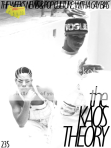

































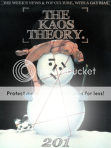




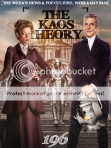






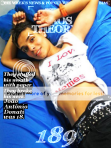














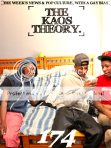

























































































































































































2 comments:
Thank you. I really enjoyed reading your thoughts on season 5. And I agree.
I agree with a lot of what's said here, and would also like to mention the very annoying habit the doctor seems to have picked up, of screaming Amy's name over and over whenever she does exactly what he told her not to do, and consequently gets into dangerous situations.
I do feel you'e being a bit hard on the series though. I'm pretty much a big kid myself, and while I did get bored of the love stories VERY quickly,I mostly tuned them out and paid much more attention to what the doctor and the aliens were doing. The crying angels in particular I found scary as, I did enjoy a couple other as well (out of a whole season lol)
anyway I do agree with this, but there was some good too ^,^
Post a Comment